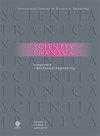Experimental investigation and multi-objective optimization of FDM process parameters for mechanical strength, dimensional accuracy, and cost using a hybrid algorithm
IF 1.9
4区 工程技术
Q2 ENGINEERING, MULTIDISCIPLINARY
引用次数: 0
Abstract
Considering many advantages of 3D printing of polymers using Fused Deposition Modeling (FDM) technique and its service nature, achieving maximum customer satisfaction is very important. The satisfaction of each particular customer may be obtained by providing one or more different outputs of this process, which may not have the same weights. This paper concentrates on multi-objective optimization of three response variables, including tensile strength, dimensional accuracy, and production cost. Eight FDM process parameters containing orientation, layer thickness, infill density, nozzle temperature, print speed, number of shells, infill pattern, and print position have been selected. For carrying out experimental studies, specimens were designed based on Taguchi L27 and manufactured according to ASTM D368-( Ⅰ ) using Polylactic Acid (PLA). Then the signal-to-noise ratio is calculated, and the mathematical regression model of all outputs is obtained. Finally, an intuitive optimal Pareto front is presented to the customer rather than a single point. By repeating the proposed algorithm for eight other customers, the average satisfaction number of 88.56% indicates the efficiency of this method.基于混合算法的FDM工艺参数机械强度、尺寸精度和成本多目标优化实验研究
考虑到使用熔融沉积建模(FDM)技术的聚合物3D打印的许多优点及其服务性质,实现最大的客户满意度非常重要。每个特定顾客的满意可以通过提供该过程的一个或多个不同的输出来获得,这些输出可能具有不同的权重。本文主要研究了抗拉强度、尺寸精度和生产成本三个响应变量的多目标优化问题。选择了八个FDM工艺参数,包括方向,层厚度,填充密度,喷嘴温度,打印速度,外壳数量,填充图案和打印位置。为了进行实验研究,基于Taguchi L27设计了样品,并根据ASTM D368-(Ⅰ)使用聚乳酸(PLA)制造。然后计算信噪比,得到各输出的数学回归模型。最后,一个直观的最优帕累托前沿呈现给客户,而不是一个单一的点。通过对其他8个客户重复该算法,平均满意度为88.56%,表明该方法的有效性。
本文章由计算机程序翻译,如有差异,请以英文原文为准。
求助全文
约1分钟内获得全文
求助全文
来源期刊

Scientia Iranica
工程技术-工程:综合
CiteScore
2.90
自引率
7.10%
发文量
59
审稿时长
2 months
期刊介绍:
The objectives of Scientia Iranica are two-fold. The first is to provide a forum for the presentation of original works by scientists and engineers from around the world. The second is to open an effective channel to enhance the level of communication between scientists and engineers and the exchange of state-of-the-art research and ideas.
The scope of the journal is broad and multidisciplinary in technical sciences and engineering. It encompasses theoretical and experimental research. Specific areas include but not limited to chemistry, chemical engineering, civil engineering, control and computer engineering, electrical engineering, material, manufacturing and industrial management, mathematics, mechanical engineering, nuclear engineering, petroleum engineering, physics, nanotechnology.
 求助内容:
求助内容: 应助结果提醒方式:
应助结果提醒方式:


